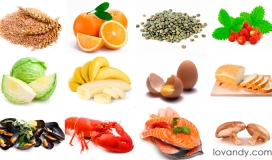Raspberry is a worldwide known berry. It grows almost everywhere in North America, Europe and Asia. Therefore, this product is being used in many meals and dishes. However, how healthy and nutrient raspberry is? Let us learn more about it!
Some Essential Nutrition Information about Raspberry
Raspberry is often considered a one species. It is not right, as there are golden and black ones. In addition, wild one is somewhat different from a garden-planted one. Of course, all these variations have their own nutritional contents. Moreover, fresh raspberry and frozen one are not the same.
Red Raspberry Nutrition
Its nutritional benefits are known as much as the berry itself. It has the richest and most varied composition of elements. In red raspberries, there is almost a full set of vitamins and minerals needed for the normal functioning of the body. For example, it contains vitamins A, B, C, E, mineral salts of calcium, potassium, magnesium, manganese, iron, zinc, sulfur and many others.
The uniqueness and usefulness of the berry is that all these substances are perfectly absorbed by the body. Moreover, the phytoncides contained in this berry have a unique antimicrobial activity. They help to strengthen immunity and protect the body from negative environmental factors.
| Name of red raspberry nutrition components | Content per 6 oz. | Percent of the daily norm |
|---|---|---|
| Proteins | 1.4 g | 1.5% |
| Fats | 0.9 g | 1.1% |
| Carbohydrates | 14.1 g | 3.5% |
| Alimentary fiber | 6.3 g | 51% |
| Water | 144 g | 7.2% |
Black Raspberry
It contains more vitamins and other nutrients than red or golden does. It is the most nutrient raspberry. However, the amount of calories is also bigger, so you may not want to use it for a diet.
This black berry is cultivar, meaning you will not find it in the forest. It is grown mostly in greenhouses or gardens. However, this does not mean it is less healthy. Being fully controlled and cared by men, this berry absorbs all the nutrients, which you will get later.
| Name of black raspberry nutrition components | Content per 6 oz. | Percent of daily norm |
|---|---|---|
| Proteins | 1.7 g | 1.8% |
| Fats | 1.0 g | 1.2% |
| Carbohydrates | 15.3 g | 3.7% |
| Alimentary fiber | 10.2 g | 71% |
| Water | 138.9 g | 7.0% |
Golden Raspberry
Golden raspberry is not as filled with nutrients as red or black ones. This kind of a berry only contains more water, meaning the concentration of elements is less. This is also the reason it is yellow. However, using the golden ones for a diet is a good idea. You may consume more berries, while receiving the same amount of microelements.
| Name of golden raspberry nutrition components | Content per 6 oz. | Percent of daily norm |
|---|---|---|
| Proteins | 1.1 g | 1.2% |
| Fats | 0.7 g | 0.9% |
| Carbohydrates | 7.2 g | 1.6% |
| Alimentary fiber | 5.1 g | 45% |
| Water | 152.2 g | 7.8% |
Wild Raspberries
The difference between wild and cultivar raspberries (red or golden) is mostly size of a single berry. The ones in a garden receive everything needed: warm, water, fertilizer. Therefore, such berries have resources for its growth. Some bush in a forest does not have all these conditions. However, many people prefer wild berries, as it may be more ecological. Anyway, nutrition is on the same level.
Frozen Raspberries Nutrition
It is a good idea to freeze any kind of raspberry. Keep it in a fridge, and you will have a nice source of vitamins for all the winter. The thing is any frozen fruit or berry almost does not lose its nutritional benefits. The same is true about black, red or golden type of the berry. Use it for making juices or jams.
| Name of frozen raspberry nutrition components | Content per 6 oz. |
|---|---|
| Proteins | equivalent * 0.87 |
| Fats | |
| Carbohydrates | |
| Alimentary fiber | |
| Water |
Fresh Raspberries Nutrition
Anything is better when it is fresh. Fresh raspberries are recommended to use in fruit salads, desserts and yogurts. However, you need to eat it as soon as possible, because berries will wither in a couple of days. Talking about nutrients, fresh raspberry is filled with it.
Dried Raspberries
Dried raspberries can be used not only as a healthy sweetness, but also as an effective remedy. For example, the medical properties of dried raspberries help to normalize blood pressure, as well as to prevent atherosclerosis.
By drying some berries, you remove all the water, leaving it a high-concentrated vitamin source. Not much nutrients are lost with drying, but the taste of dried raspberry is something different and delicious. So, use it for your diet, if you like it.
| Name of raspberry nutrition component | Content per 6 oz. | Percent of daily norm |
|---|---|---|
| Proteins | 11.9 g | 13.2% |
| Fats | 7.2 g | 7.8% |
| Carbohydrates | 42.1 g | 10.5% |
| Alimentary fiber | 27.4 g | 182% |
| Water | 73.5 g | 3.4% |
Does Raspberry Contain a Lot of Ketones?
Ketones are organic substances, needed for your body to stimulate metabolism, thereby increasing the rate of digestion of fat. Most known ketones are acetone, benzophenone, diacetyl etc. Raspberry contains some ketones, but not so much. We are talking about approximately 2-4 mg per 1 kilo (daily dose for a person is 100-500 mg).
The thing is these substances are often used in medicine and cosmetology as a food supplement. It helps to lose weight. Raspberry ketones are hard to get straight from the berry. Therefore, it is usually synthesized artificially and you can find some raspberry ketone in a local pharmacy.
Vitamins that Rusbrerry Contains
All kinds of raspberry we have mentioned above contain vitamins A, B1, B2, B5, B6, B9, C, K and E.
- Vitamin A is important for your vision and antioxidant defense of the body. The immune system is weak without it. Moreover, A vitamin is used in digestion processes.
- Group of B vitamins participates in all types of metabolic processes, helps to maintain a normal state of skin and mucous membranes, takes part in synthesis of hemoglobin.
- Vitamin C, or ascorbic acid, is used for formation of collagen, catecholamines and serotonin from tryptophan, synthesis of corticosteroids. Ascorbic acid is also involved in the conversion of cholesterol to bile acids. This means you need this vitamin for your immune system to work properly. In addition, without vitamin C your muscles would feel weak.
- Vitamin E is a nice immunomodulator and antioxidant. It helps your cells to breathe properly and receive a necessary amount of nutrients.
- K vitamin is very important for digestion. It helps your intestines to work properly. In addition, vitamin K takes part in bones formation, helping to build it. That is why it may be used for treatment of fractures.
Beside these vitamins, any raspberry contains a big amount of potassium, sulfur, iron, phosphorus and calcium. These elements are very important for your health (find out more about raspberry health benefits here). For example, calcium and vitamins K are used for bones formation; iron is need for a proper blood circulation; sulfur helps to keep hair and nails beautiful and strong etc.
| Name of raspberry nutrition component | Content per 6 oz. | Percent of daily norm |
|---|---|---|
| Vitamin A | 56.1 μg | 5.1% |
| Vitamin B1 | 0.034 mg | 3.4% |
| Vitamin B2 | 0.085 mg | 4.2% |
| Vitamin B5 | 0.34 mg | 3.4% |
| Vitamin B6 | 0.119 mg | 4.1% |
| Vitamin B9 | 10.2 μg | 2.7% |
| Vitamin C | 42.5 mg | 75% |
| Vitamin K | 25.7 μg | varies |
| Vitamin E | 1.02 mg | 10.2% |
| Potassium | 380.8 mg | 7.5% |
| Sulfur | 27.2 mg | 5.1% |
| Iron | 2.1 mg | 4.7% |
| Phosphorus | 62.9 mg | 11.2% |
| Calcium | 68 mg | 11.4% |
| Cuprum | 289 mg | 10% |
| Zinc | 0.4 mg | 2.7% |
| Chlorine | 35.7 mg | 15% |
Raspberries and Sugar
We all know that inimitable taste of a sweet raspberry. The reason for such sweetness in sugar, which is 5-10% of raspberry. However, you should not worry about it, because this sugar is only fructose and sucrose. Such organic elements are harmless, yet even useful for your body. This sugar content doesn’t make raspberry to be very high in calories.
These two elements do not only make a berry sweet. Combined with all the vitamins, it is used for cells supply. Without fructose or sucrose, your erythrocytes will be weak, and immune system may fade.
Glycemic Index of Raspberry
Any berry or fruit has a low glycemic index. This is due to the concentration of sugar there, which is not significant. Talking about this nice berry, its glycemic index equals 25. Such value does not mean it is hard for your body to digest it. It is just because there is almost nothing to. Notice that even filled with vitamins black raspberry has the index of only 40.
Fiber Content in Raspberry
Complex carbohydrates are an integral component of a healthy diet. Alimentary fiber is a “food” for the microflora of intestines. It is responsible for our immunity and many other vital processes occurring in human body. Fiber is a “cleaner”. Without it, the body loses its ability to self-purification. Fiber also removes poisons and toxins from cells.
Alimentary fiber is the element only fresh raspberries contain. Cellulose is nothing without water, so dried or frozen berries lack it.
Considering everything mentioned, raspberry is truly a healthy and nutritional product. It contains a huge amount of vitamins and elements, which are extremely needed for your body. Moreover, there are many different ways of eating raspberry, such as salads, desserts or just as is. These little berries are not only delicious, but also really beneficial.














